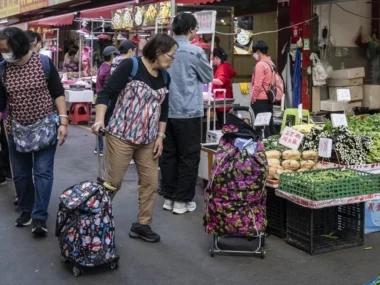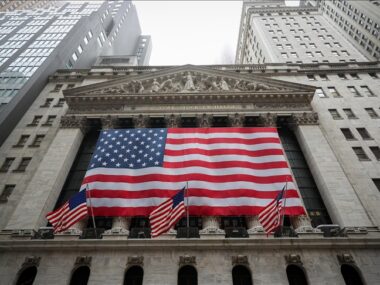The Chinese stock market had a challenging year in 2023, and the downturn has intensified in the early weeks of 2024. This decline follows Beijing’s decision not to provide additional support to the struggling economy.
On Monday, Hong Kong’s Hang Seng Index dropped by 2.3%, reaching its lowest point since October 2022. It has lost over 12% of its value this month, almost matching its total loss for the entire year of 2023. Mainland China’s Shanghai Composite Index experienced a significant drop of 2.7%, marking its most substantial daily decline since April 2022. The Shenzhen Component Index, which is heavily focused on technology stocks, suffered its worst day in nearly two years, plummeting by 3.5%. These indexes have collectively fallen by 4.8% and 7.7% in the first few trading days of 2024.
This marks the worst start to a year for Chinese stocks since 2016 when investors were selling off their holdings following the market crash in 2015. Back then, a bubble burst as the economy faced strain, and stock prices far exceeded company profits. Recent factors contributing to the decline include a real estate crisis, the slowest economic growth (excluding the pandemic) in decades, and increased regulatory measures affecting certain businesses, all of which have eroded investor confidence.
Ken Cheung, the chief Asian foreign exchange strategist at Mizuho Bank, noted on Monday that foreign investors were reducing their exposure to China and had pessimistic expectations for the country’s business conditions. He mentioned that the Chinese government has not implemented effective measures to address the property market crisis and stimulate economic recovery.
Investors were disappointed when China’s central bank chose to maintain its benchmark lending rate on Monday. A rate cut would have lowered borrowing costs for individuals and businesses, potentially boosting economic activity. These significant market losses in 2024 come after a tough year in 2023, during which the CSI 300 index, comprising 300 major stocks listed in Shanghai and Shenzhen, fell by over 11%.
In contrast, the United States’ S&P 500 index gained 24% in 2023, while Europe’s stock market grew by nearly 13%. Japan’s Nikkei 225 performed exceptionally well, surging by 28% last year and continuing to show gains of nearly 10% in the early part of this month.
Investor concerns were compounded by recent demographic data confirming that China’s population is aging and shrinking. They were also troubled by the absence of new government stimulus measures in a speech by Chinese Premier Li Qiang at the World Economic Forum last week.
Analysts at ANZ Research, Brian Martin, and Daniel Hynes, mentioned in a Friday research note that Li’s speech had dampened expectations of further support measures. They noted that he emphasized the country’s ability to achieve its 5% growth target without resorting to massive stimulus, and in recent months, Beijing has issued $137 billion worth of government bonds, primarily for funding infrastructure projects, while China’s sovereign wealth fund has purchased shares to support the struggling stock market.
Fatigued shareholders
Li’s speech seems to have further disheartened investors who were already fatigued due to a series of disappointing economic indicators emerging from Beijing, including the ongoing real estate crisis and a rapidly declining population.
The country’s economy managed to achieve a growth rate of 5.2% last year, surpassing government projections but still representing one of China’s weakest economic performances in more than three decades. The International Monetary Fund predicts a slowdown in the country’s economic growth to 4.2% this year.
In 2023, investors had high hopes for a rebound in China’s economy after Beijing abandoned its strict zero-Covid policy at the end of the previous year. However, this anticipated robust recovery failed to materialize, leading investors to express their dissatisfaction by withdrawing their investments. According to China’s Commerce Ministry, foreign direct investment in the country decreased by 8% in 2023 compared to the previous year.
Investors have also been cautious about Beijing’s broad crackdown on private enterprises, which began in late 2020 and involved imposing fines on foreign companies and detaining their employees in the name of national security. In his January 16 speech, Li attempted to reassure international investors by portraying China as an “opportunity rather than a risk” and pledging to create a “world-class” environment for foreign companies to conduct business within the country.
Li also pointed out that the number of individuals classified as middle-income in China is expected to double to 800 million over the next decade, emphasizing the strong momentum for consumption.
However, Stephen Innes, managing partner of SPI Asset Management, cautioned that investors who choose to expose themselves to China’s precarious situation should be aware of the risks, as they may find themselves navigating an unpredictable and authoritarian financial environment. He suggested that success in such investments might depend on selecting shares that avoid government scrutiny, making the entire investment process more akin to a game of chance rather than an informed decision-making process.











